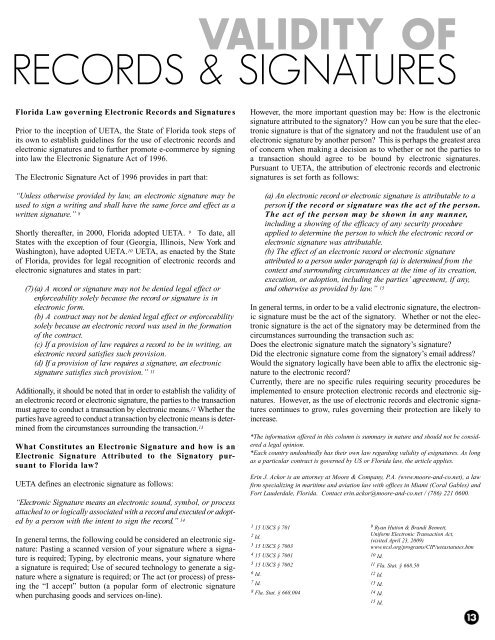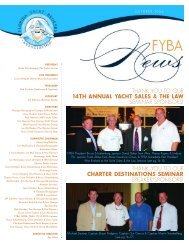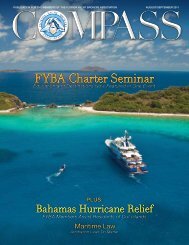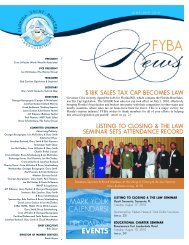May 2009 - Florida Yacht Brokers Association, Inc.
May 2009 - Florida Yacht Brokers Association, Inc.
May 2009 - Florida Yacht Brokers Association, Inc.
Create successful ePaper yourself
Turn your PDF publications into a flip-book with our unique Google optimized e-Paper software.
VALIDITY OF<br />
RECORDS & SIGNATURES<br />
<strong>Florida</strong> Law governing Electronic Records and Signatures<br />
Prior to the inception of UETA, the State of <strong>Florida</strong> took steps of<br />
its own to establish guidelines for the use of electronic records and<br />
electronic signatures and to further promote e-commerce by signing<br />
into law the Electronic Signature Act of 1996.<br />
The Electronic Signature Act of 1996 provides in part that:<br />
“Unless otherwise provided by law, an electronic signature may be<br />
used to sign a writing and shall have the same force and effect as a<br />
written signature.” 8<br />
Shortly thereafter, in 2000, <strong>Florida</strong> adopted UETA. 9 To date, all<br />
States with the exception of four (Georgia, Illinois, New York and<br />
Washington), have adopted UETA. 10 UETA, as enacted by the State<br />
of <strong>Florida</strong>, provides for legal recognition of electronic records and<br />
electronic signatures and states in part:<br />
(7)(a) A record or signature may not be denied legal effect or<br />
enforceability solely because the record or signature is in<br />
electronic form.<br />
(b) A contract may not be denied legal effect or enforceability<br />
solely because an electronic record was used in the formation<br />
of the contract.<br />
(c) If a provision of law requires a record to be in writing, an<br />
electronic record satisfies such provision.<br />
(d) If a provision of law requires a signature, an electronic<br />
signature satisfies such provision.” 11<br />
Additionally, it should be noted that in order to establish the validity of<br />
an electronic record or electronic signature, the parties to the transaction<br />
must agree to conduct a transaction by electronic means. 12 Whether the<br />
parties have agreed to conduct a transaction by electronic means is determined<br />
from the circumstances surrounding the transaction. 13<br />
What Constitutes an Electronic Signature and how is an<br />
Electronic Signature Attributed to the Signatory pursuant<br />
to <strong>Florida</strong> law?<br />
UETA defines an electronic signature as follows:<br />
“Electronic Signature means an electronic sound, symbol, or process<br />
attached to or logically associated with a record and executed or adopted<br />
by a person with the intent to sign the record.” 14<br />
In general terms, the following could be considered an electronic signature:<br />
Pasting a scanned version of your signature where a signature<br />
is required; Typing, by electronic means, your signature where<br />
a signature is required; Use of secured technology to generate a signature<br />
where a signature is required; or The act (or process) of pressing<br />
the “I accept” button (a popular form of electronic signature<br />
when purchasing goods and services on-line).<br />
However, the more important question may be: How is the electronic<br />
signature attributed to the signatory? How can you be sure that the electronic<br />
signature is that of the signatory and not the fraudulent use of an<br />
electronic signature by another person? This is perhaps the greatest area<br />
of concern when making a decision as to whether or not the parties to<br />
a transaction should agree to be bound by electronic signatures.<br />
Pursuant to UETA, the attribution of electronic records and electronic<br />
signatures is set forth as follows:<br />
(a) An electronic record or electronic signature is attributable to a<br />
person if the record or signature was the act of the person.<br />
The act of the person may be shown in any manner,<br />
including a showing of the efficacy of any security procedure<br />
applied to determine the person to which the electronic record or<br />
electronic signature was attributable.<br />
(b) The effect of an electronic record or electronic signature<br />
attributed to a person under paragraph (a) is determined from the<br />
context and surrounding circumstances at the time of its creation,<br />
execution, or adoption, including the parties’ agreement, if any,<br />
and otherwise as provided by law.” 15<br />
In general terms, in order to be a valid electronic signature, the electronic<br />
signature must be the act of the signatory. Whether or not the electronic<br />
signature is the act of the signatory may be determined from the<br />
circumstances surrounding the transaction such as:<br />
Does the electronic signature match the signatory’s signature?<br />
Did the electronic signature come from the signatory’s email address?<br />
Would the signatory logically have been able to affix the electronic signature<br />
to the electronic record?<br />
Currently, there are no specific rules requiring security procedures be<br />
implemented to ensure protection electronic records and electronic signatures.<br />
However, as the use of electronic records and electronic signatures<br />
continues to grow, rules governing their protection are likely to<br />
increase.<br />
*The information offered in this column is summary in nature and should not be considered<br />
a legal opinion.<br />
*Each country undoubtedly has their own law regarding validity of esignatures. As long<br />
as a particular contract is governed by US or <strong>Florida</strong> law, the article applies.<br />
Erin J. Ackor is an attorney at Moore & Company, P.A. (www.moore-and-co.net), a law<br />
firm specializing in maritime and aviation law with offices in Miami (Coral Gables) and<br />
Fort Lauderdale, <strong>Florida</strong>. Contact erin.ackor@moore-and-co.net / (786) 221 0600.<br />
1 15 USCS § 701<br />
2 Id.<br />
3 15 USCS § 7003<br />
4 15 USCS § 7001<br />
5 15 USCS § 7002<br />
6 Id.<br />
7 Id.<br />
8 Fla. Stat. § 668.004<br />
9 Ryan Hutton & Brandi Bennett,<br />
Uniform Electronic Transaction Act,<br />
(visited April 23, <strong>2009</strong>)<br />
www.ncsl.org/programs/CIP/uetastatutes.htm<br />
10 Id.<br />
11 Fla. Stat. § 668.50<br />
12 Id.<br />
13 Id.<br />
14 Id.<br />
15 Id.











